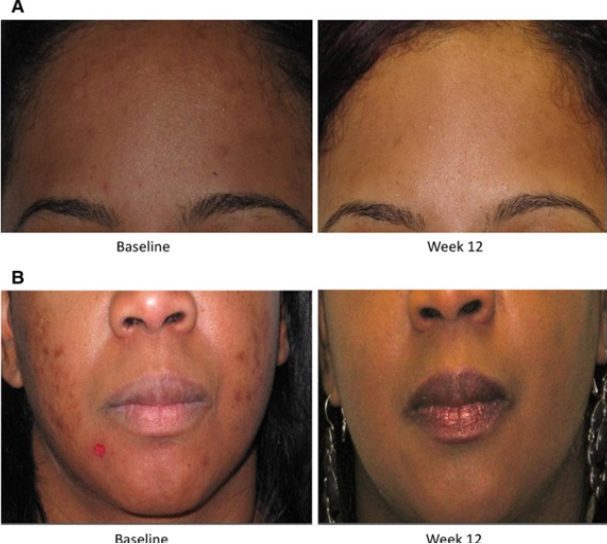Vitamin B5: The Acne Solution

FxMed Tech Support Team
Vitamin B5 is already well established for adrenal and stress support—and is now being increasingly recognised as a great clinical tool for Acne support.
Pantothenic acid (vitamin B5) supplementation has been shown to significantly reduce acne within just 12 weeks of supplementation.
Acne patients with poor facial skin tend to have reduced quality of life with regard to dissatisfaction about appearance, social impacts and even co-morbid depression.1 These psychological effects are not necessarily related to its clinical severity, as even mild acne can be significantly disabling. Acne can affect people of all ages but it predominantly occurs during the teenage years.
Approximately 85% of people between the ages of 12 and 24 experience at least mild acne.2 As such, this safe and well tolerated water-soluble B vitamin is becoming a popular choice for practitioners in dealing with moderate to severe acne in patients, after numerous reports of success in private clinics as well as emerging public clinical studies that strengthen claims that this vitamin is a valid clinical tool to assist patients struggling with acne related conditions.
Pantothenic Acid’s (B5) role in Reducing Acne
There are a number of potential mechanisms of action that could contribute to B5’s clinically relevant benefits in the reduction of acne.
- Pantothenic acid is converted into 4’-phosphopantetheine that is then converted to co-enzyme A simply via ATP.
- It has been hypothesised that acne results from a reduced efficiency in lipid metabolism, via co-enzyme A, that is secondary to a deficiency in pantothenic acid.
- Co-enzyme A is a critical agent important in lipid metabolism and other cellular processes and it has been shown that pantothenic acid may regulate epidermal barrier function through proliferation and differentiation of keratinocytes via co-enzyme A metabolism.3
- Pantothenic acid may additionally demonstrate potential antibacterial and skin softening activity.3
In this study, men and women volunteers with facial lesions who took a daily oral dose (1.1 g bid) of a pantothenic acid-based dietary supplement demonstrated improved skin health versus those who took a placebo tablet.



The results indicated that the administration of a pantothenic-based dietary supplement in healthy human adults with facial lesions is safe, well tolerated and reduces total facial lesion. Supplementation demonstrated a greater than 67% reduction in the number of total facial lesions, a significant mean reduction in the number of non-inflammatory blemishes and overall efficacy, as measured by the Investigators Global Assessment, was significantly improved for the study agent group versus placebo at week 12.
In addition, subjects in the study agent group demonstrated better quality of life as measured by the Dermatology Life Quality Index; a well-validated quantitative questionnaire that measures the bother of unclear skin on patients’ quality of life with regard to social, behavioural and mood indicators. Most importantly, the study agent was safe as demonstrated by minimal adverse events and no changes in serum blood chemistries.
Symptoms of B5 Deficiency May Include:
- Fatigue
- Headache
- Muscular cramp and weakness
- Gastrointestinal disturbances
- Sleep disturbances
- Burning sensation of the hands and feet
- Cardiovascular instability
- Impaired motor coordination
- A loss of the normal eosinopenic response to adrenocorticotropic hormone
Pantothenic Acid (B5) May be Clinically Relevant For:
- Supporting optimal integrity of the skin6
- Supporting ATP /energy production from the metabolism of carbohydrates, proteins and fats from food
- Supporting healthy synthesis and metabolism of lipids and essential fatty acids (including essential fatty acids and steroid hormones)9
- Supporting adrenal gland function including a healthy stress response
- Support the production of the neurotransmitter acetylcholine and the hormone melatonin9
- Barnes LE, Levender MM, Fleischer AB, Jr, Feldman SR. Quality of life measures for acne patients. Dermatol Clin. 2012;30(2):293–300.
- Bhate K, Williams HC. Epidemiology of acne vulgaris. The British journal of dermatology 2013;168:474-85.
- Kelly GS. Pantothenic acid. Monograph. Altern Med Rev. 2011;16(3):263–274.
- Leung, L. A Stone that Kills two Birds: How Pantothenic Acid Unveils the Mysteries of Acne Vulgaris and Obesity. J of Orthomolecular Medicine 1997;12:99-113.
- Kobayashi D, Kusama M, Onda M, Nakahata N. The effect of pantothenic acid deficiency on keratinocyte proliferation and the synthesis of keratinocyte growth factor and collagen in fibroblasts. J Pharmacol Sci. 2011;115(2):230–4.
- Yang M, Moclair B, Hatcher V, Kaminetsky J, Mekas M, Chapas A, Capodice J. A randomized, double-blind, placebo-controlled study of a novel pantothenic Acid-based dietary supplement in subjects with mild to moderate facial acne. Dermatol Ther (Heidelb). 2014 Jun; 4(1): 93–101.
- Hodges RE, Bean WB , Ohlson MA, Bleiler R. Human pantothenic acid de!ciency produced by omega-methyl pantothenic acid. J Clin Invest 1959;38:1421-1425.
- Hodges RE, Ohlson MA, Bean WB. Pantothenic acid defciency in man. J Clin Invest 1958;37:1642-1657.
- Riordan HD, Mikirova N, Taylor PR, Feldkamp CA, Casciari JJ. The Effects of a Primary Nutritional Deficiency (Vitamin B Study). Food and Nutrition Sciences 2012;3:1238-1244.
- Jaroenporn S1, Yamamoto T, Itabashi A, Nakamura K, Azumano I, Watanabe G, Taya K. Effects of pantothenic acid supplementation on adrenal steroid secretion from male rats. Biol Pharm Bull 2008; 31:1205-8.
Share:
Related Posts

Why Would I Test Positive To Foods On A Dietary Antigen Test That I Don’t Eat?
Written by Precision Point Diagnostics | 2025 True food allergies are when the body develops antibodies against a particular food, or a related food. Patients

Mitochondria: The Overlooked Link in the Gut-Brain Axis
Written by Dr Sarah Daglis | 2025 The gut-brain axis is well-established, but there’s more to this dynamic relationship than meets the eye. A vital

Unlocking Respiratory Resilience Through Functional Medicine
Article written by Dr Michelle Clark Naturopathic Doctor Clinical Education Manager, FxMed Published 1 September 2024 People take supplements to improve or optimize their health.

AHCC: Unlocking the Immune Intelligence of Shiitake Mycelia
Article written by Jessica Sanders BSc. (Psy), Dip Nat, Dip Med Herb Technical Projects, FxMed Published 1 September 2024 People take supplements to improve or

Life After Weight Loss Meds
Kathi Head, ND February 20, 2025 You would have to have been spending glorious hours lying on the beach on a desert island not to

